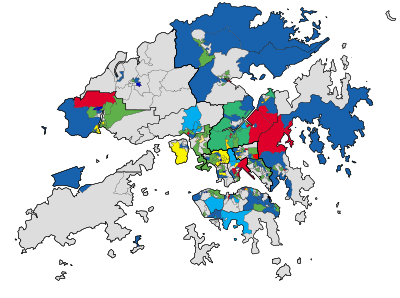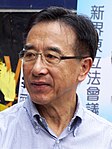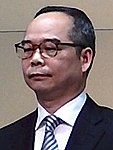
The Democratic Alliance for the Betterment and Progress of Hong Kong (DAB) is a pro-Beijing conservative political party in Hong Kong. Chaired by Starry Lee and holding 13 Legislative Council seats, it is currently the largest party in the legislature and in terms of membership, far ahead of other parties. It has been a key supporting force to the SAR administration and the central government's policies on Hong Kong.
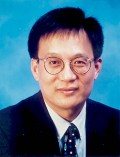
The 2004 Hong Kong Legislative Council election was held on 12 September 2004 for members of the Legislative Council of Hong Kong (LegCo). The election returned 30 members from directly elected geographical constituencies and 30 members from functional constituencies, of which 11 were unopposed.

The Kowloon West geographical constituency was one of the five geographical constituencies of the Legislative Council of Hong Kong from 1998 to 2021. It was established in 1998 for the first SAR Legislative Council election and was abolished under the 2021 overhaul of the Hong Kong electoral system. In the 2016 Legislative Council election, it elected six members of the Legislative Council using the Hare quota of party-list proportional representation. It had 602,733 registered electorates in 2020. The constituency corresponded to the districts of Yau Tsim Mong, Sham Shui Po, and Kowloon City.

The Kwai Tsing District Council is the district council for the Kwai Tsing District in Hong Kong. It is one of 18 such councils. It currently consists of 32 members of which 31 are directly elected from the 31 constituencies of the district, one ex-officio member who is the Tsing Yi Rural Committee chairman. The latest election was held on 24 November 2019.
The 1996 Hong Kong Chief Executive election was held on 11 December 1996 to select the first Chief Executive (CE) of the Hong Kong Special Administrative Region (HKSAR) which term started from 1 July 1997 after the Chinese resumption of the sovereignty of Hong Kong from the British rule. It was selected by the 400-member Selection Committee installed by the Government of the People's Republic of China (PRC). Tung Chee-hwa, a Shanghai-born Hong Kong businessman who was seen being favoured by Jiang Zemin, General Secretary of the Chinese Communist Party, was the ultimate winner of the election, defeating former Chief Justice Ti-liang Yang and tycoon Peter Woo with a large margin.

The 1996 Hong Kong Provisional Legislative Council election was held on 21 December 1996 for the members of the Provisional Legislative Council (PLC). The 60 members of the PLC was elected by the Selection Committee, a 400-member body elected by the Preparatory Committee for the Hong Kong Special Administrative Region, a Beijing-appointed body which was responsible for implementation work related to the establishment of the HKSAR.

The 1995 Hong Kong Legislative Council election for members of the Legislative Council of Hong Kong (LegCo) was held on 17 September 1995. It was the first, and only, fully elected legislative election in the colonial period before transferring Hong Kong's sovereignty to China two years later. The elections returned 20 members from directly elected geographical constituencies, 30 members from indirectly elected functional constituencies, and 10 members from elections committee constituency who were elected by all District Board members.

The 2007 Hong Kong District Council elections were held on 18 November 2007. Elections were held to all 18 districts of Hong Kong, returned 405 members from directly elected constituencies out of total 534 councils member. A total number of 886 candidates contesting in 364 seats, while 41 seats were uncontested. A total number of 1.4 million voters cast their ballots, consisting 38% of the electorate, significantly lower than the last elections in 2003.
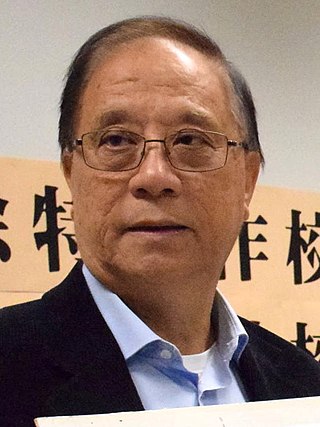
The 2003 Hong Kong District Council elections were held on 23 November 2003 for all 18 districts of Hong Kong, 400 members from directly elected constituencies out of total 529 council members. It was the second District Council election after the handover of Hong Kong in 1997.

The Central and Western District Council is the district council for the Central and Western District in Hong Kong. It is one of 18 such councils. The Central and Western District Council currently consists of 15 members, of which the district is divided into 15 constituencies, electing a total of 15 members. The last election was held on 24 November 2019.

The Kowloon City District Council is the district council for the Kowloon City District in Hong Kong. It is one of 18 such councils. The Kowloon City District Council currently consists of 25 members, of which the district is divided into 25 constituencies, electing a total of 25 members. The last election was held on 24 November 2019.

The Sham Shui Po District Council is the district council for the Sham Shui Po District in Hong Kong. It is one of 18 such councils. The Sham Shui Po District Council currently consists of 25 members, of which the district is divided into 25 constituencies, electing a total of 25 members. The last election was held on 24 November 2019.

The Yau Tsim Mong District Council is the district council for the Yau Tsim Mong District in Hong Kong. It is one of 18 such councils. The Yau Tsim Mong District Council currently consists of 20 members, of which the district is divided into 20 constituencies, electing a total of 20 members. It was merged from the Mong Kok District Board and Yau Tsim District Board in 1994 due to the significant drop of the population in the districts. The latest election was held on 24 November 2019.

The North District Council is one of the 18 Hong Kong district councils and represents the North District. It is one of 18 such councils. Consisting of 22 members, the district council is drawn from 18 constituencies, which elect 18 members, along with four ex officio members who are the Ta Kwu Ling, Sheung Shui, Sha Tau Kok and Fanling rural committee chairmen. The latest election was held on 24 November 2019.

The Sai Kung District Council is the district council for the Sai Kung District in Hong Kong. It is one of 18 such councils. The Sai Kung District Council currently consists of 31 members, of which the district is divided into 29 constituencies, electing a total of 29 with two ex-officio members who are the Hang Hau and Sai Kung rural committee chairmen. The latest election was held on 24 November 2019.

The Sha Tin District Council is the district council for the Sha Tin District in Hong Kong. It is one of 18 such councils. The Sha Tin District Council currently consists of 42 members, of which the district is divided into 41 constituencies, electing a total of 41 with 1 ex officio member who is the Sha Tin rural committee chairman. The latest election was held on 24 November 2019.

The Tai Po District Council is the district council for the Tai Po District in Hong Kong. It is one of 18 such councils. The Tai Po District Council currently consists of 21 members, of which the district is divided into 19 constituencies, electing a total of 19 with 2 ex officio members who are the Tai Po and Sai Kung North rural committee chairmen. The latest election was held on 24 November 2019.

The 1994 Hong Kong District Board elections were held on 18 September 1994 for all 18 districts of Hong Kong and 346 members from directly elected constituencies. It was the last district-level elections in the colonial period before the handover of Hong Kong in 1997. It was the first elections to be held after the abolition of the appointed seats as proposed by the new electoral arrangements, as the last step of the democratisation by the then Governor Chris Patten before the handover.

The 2015 Hong Kong District Council elections were held on 22 November 2015. Elections were held to all 18 District Councils with returning 431 members from directly elected constituencies after all appointed seats had been abolished.
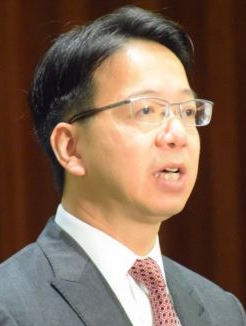
The 2018 Hong Kong Legislative Council by-election was held on 11 March 2018 for four of the six vacancies in the Legislative Council of Hong Kong (LegCo) - the Hong Kong Island, Kowloon West and New Territories East geographical constituencies and the Architectural, Surveying, Planning and Landscape functional constituency - resulting from the disqualification of six pro-democrat and localist camp Legislative Council members over the 2016 oath-taking controversy. The by-election for the two other seats was not held due to pending legal appeals by the two disqualified legislators.
